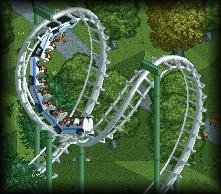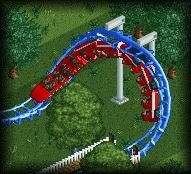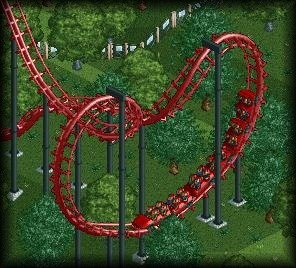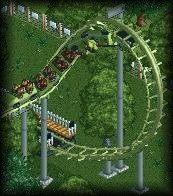
So, what are inversion elements anyway?
There are many types of Inversion Elements used on real roller costers around the world. Listed here are pictures and guides on how to build some of the more common ones for RCT.

The boomerang loop is a very popular inversion element used on many modern coasters. It consists of two half-loops and two half-corkscrews. To build it, make sure the track is sloped up and go to the specials menu and select half loop. Then go back to the specials and select half-corkscrew either left or right. Do the same thing again but make sure the corkscrew is facing the same direction (i.e. if you chose right half-corkscrew, choose right again). Then go to the specials menu and select half-loop and you're done!

The cutback is a very intense, but simple inversion used on a few coasters, most notoriously Drachen Fire in Busch Gardens Williamsburg. It consists of two half-corkscrews. To build it go to the specials menu and select half-corkscrew either left or right. Then just place another half-corkscrew in the same direction.

The diving loop is a very thrilling inversion, throwing riders into it going one direction and out of it the opposite direction at a much higher speed. It is made by building one half-corkscrew high enough above the ground so the half loop will fit beneath it just like the picture above.

The heart loop, named for it's shape, is the exact opposite of a boomerang. It exits the inversion the exact opposite direction it came in. Start above the ground enough so the half loops will fit. Build a half-corkscrew to the left first, then a half loop. After that, slope the track back up using one or two pieces of track and add another half loop and a half-corkscrew right this time.

The following is the approximate minimum and maximum speeds your train should be traveling just before it enters an inversion element. Note that many factors such as train weight, length, or slipstream effects with other trains will affect actual speed choice:
Large Vertical Loop = 50mph min., 65mph max.
Vertical Loop = 38mph min., 48mph max.
Half Loop = 38mph min., 50mph max.
Corkscrew = 28mph min., 42mph max.
Barrel Roll = 6mph min., 45mph max.